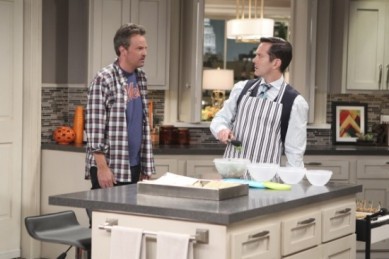
The new CBS situation comedy The Odd Couple (Thursdays at 8:30) is based very evidently on the beloved 1970s sitcom, which starred Jack Klugman and Tony Randall as mismatched roommates Oscar Madison and Felix Unger, respectively, but is surprisingly different in its ultimate effect. Starting with a jazzed-up iteration of the prior show’s theme song, this reboot has the same basic outlines as the classic 1970s version.
Madison, you will recall if you’ve ever seen the show, is a sportswriter and a slob who enjoys cigars, alcohol, the ladies, and never cleaning up after himself. Felix, a photographer, is the classic “uptight” individual, obsessed with cleanliness, social status, and his health.
The comedy of the show centered on the obvious personality conflict between the two men, but the show’s producers wisely also foregrounded the solid foundation of the two men’s friendship, which was in their strong consciences: for all their faults, both Felix and Oscar ultimately wanted to do what was right. The humor of the show was in their very different opinions on what is right, and it is there that the show had some very interesting implications.
Oscar is essentially a libertarian, and a basically cheerful and independent fellow. He believes that his good-timey lifestyle is of no harm to anyone, and he is right about that, in the strictest terms: nobody but Felix is bothered by Oscar’s sloppiness. Felix, on the other hand, is a progressive type, always conveying a sense of superiority and hectoring the libertarian Oscar with Felix’s opinions on how Oscar should live his life.
Oscar generally comes off as the more sympathetic character, for even though he fails to pull his weight as regards dishwashing and laundry, he wants nothing more than to live and let live. Felix, by contrast, is certain that he knows what is best for everyone, and he continually insists that everyone change their ways to comport with his idea of what is right.
Both men are divorced, thus suggesting the limitations of their ways of life. Each is selfish in his own way, and their differences are instructive. In a marriage, Oscar’s careless independence was disastrous, but in most other relationships it is a boon. Felix’s suffocating intrusiveness and belief in his own omniscience were equally disastrous to his marriage, and unlike Oscar’s independence, it causes stress in his other personal relationships as well.
That was the real brilliance of the show, bringing out in great detail, week after week, what was implicit in Neil Simon’s play and the classic 1968 movie based on it, which starred Jack Lemmon and Walter Matthau. The greatness of the 1970s Odd Couple sitcom was the ingenuity with which it domesticated the great debate of that era: whether America was too free and needed stronger rule by experts, or whether the nation was plagued by big-government and big-business know-it-alls and needed to be freed from their suffocating and neurotic oppression.
Thus The Odd Couple dealt with the same national worries as Norman Lear sitcoms such as All in the Family and Maude, but was more winsome and pleasant in doing so, by avoiding the actual political controversies of the day and dealing with the fundamentals that were driving them. It was, it should thus be clear, an extremely smart show, and producer Garry Marshall would be a comedy legend for this series alone if he had never made any others.
The same issues that preoccupied the nation back in the early 1970s are at the forefront of people’s concerns today, but unfortunately the new sitcom version of The Odd Couple does not initially seem very intelligent or insightful at all. There are some funny dialogue lines to be found here and there, and a good deal more sexual humor than is strictly necessary or even endurable by a normal human being. The latter, of course, is pretty much to be expected these days, alas, so I suppose complaining about it would be rather too Unger-like.
On the plus side, Thomas Lennon makes an excellent Felix Unger. His characterization seems to owe very little to Randall’s and Lemmon’s performances; instead he carves out his own distinctive interpretation, retaining the character’s essential prissiness but replacing their prickliness with a strong streak of emotional vulnerability. It’s a very good choice on his part, making his Felix the most likeable of the three.
Unfortunately, that tends to undermine the natural dynamic between the two characters, although Felix’s intrusiveness remains. The real and abiding problem with the show, however, is Matthew Perry’s Oscar Madison. Perry is simply awful, in fact surprisingly bad. He delivers every line with the same lack of inflection, speaking loudly and without interesting or revealing changes in tone. He scowls continually.
It appears that Perry learned only one thing from the performances of Klugman and Matthau, that they have loud voices. Those actors, however, managed to convey a variety of attitudes other than frustration, such as irony, sarcasm, joyful triumph (when winning at cards, for example), sexual attraction, and the like. Perry, unfortunately, seems merely loud and continually frustrated. This continuous grumpiness distorts the dichotomy at the center of the Odd Couple concept: Oscar’s likeable independence versus Felix’s insufferable intrusiveness.
An unlikeable Oscar and a somewhat likeable Felix might seem to be a justifiable new angle on the story, but it makes for an entirely different concept. Those characterizations may change over time, but the pilot episode gives no indication that Perry will turn on the charm any time soon, nor that Lennon will ramp up the character’s prickliness. Depicting independence as loud and annoying, and intrusiveness as a manifestation of kindly concern, makes this Odd Couple a comedy for a politically progressive time: a paean to self-satisfaction, a sense of superiority, desperate fear of mortality, and incessant meddling in other people’s lives.
Perhaps, then, this new version is just as much a sitcom for its time as the 1970s show was for its era.

